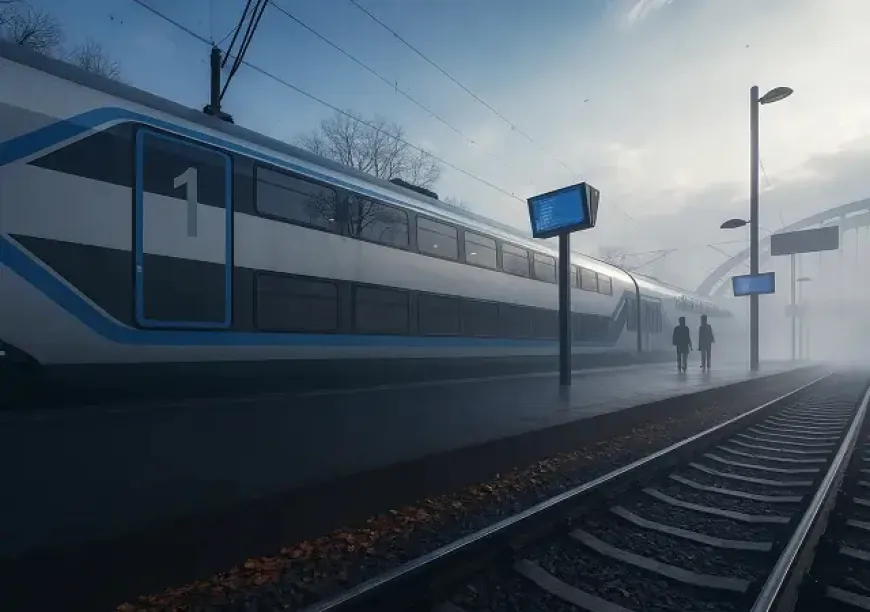42 Double-Deck 200km/h EMUs for PKP Intercity
Alstom secures 4.1 billion zloty PKP Intercity contract for 42 double-deck electric trains manufactured in Chorzów. Poland's rail revolution begins.

Standfirst: Alstom wins a 4.1 billion zloty contract with PKP Intercity for 42 double-deck electric trains running at 200km/h, manufactured directly in Poland at the Chorzów facility.
Updated on September 8, 2025
A New Chapter for Polish Rail Travel
PKP Intercity has selected Alstom as the preferred bidder for a significant fleet expansion. This contract will bring 42 state-of-the-art 200km/h double-deck Electric Multiple Units (EMUs) to Poland, with an option for 30 additional trains.
This major order stands out for its local production: the units will be manufactured directly in Poland, signifying a considerable investment in national manufacturing industry.
The Landmark Contract: Alstom's Winning Bid and Strategic Advantages
Financial Scope and Competitive Edge
Alstom won the tender with a proposal of 4.1 billion zlotys ($1 billion US) for train supply, complemented by 2.8 billion zlotys for 30 years of maintenance. Decisive element: Alstom's total bid was nearly 400 million zlotys cheaper than competitor Stadler's offer.
This substantial pricing difference weighed heavily in PKP Intercity's final decision.
Beyond Price: Key Selection Criteria
PKP Intercity's selection wasn't solely based on cost: other important criteria such as energy efficiency and delivery dates were also assessed. This approach demonstrates a strategic decision-making process integrating performance and economic viability.
Introducing the New Double-Deck Fleet: Speed, Capacity, and Comfort
High-Performance and High-Capacity Design
The trains will operate at speeds up to 200km/h. Each unit can accommodate more than 500 passengers, significantly boosting capacity on key Polish network routes.
This configuration responds to growing demand for long-distance rail transport in Poland.
Enhancing the Passenger Experience
Onboard equipment prioritizes comfort: air conditioning, reclining seats with individual tables, armrests, footrests, and adjustable lighting. Passengers will enjoy Wi-Fi, power sockets and USB ports, with travel information displayed on onboard screens.
Advanced Amenities and Interoperability for Modern Travel
Tailored Accommodation and Accessibility
The units offer diverse zones: first and second-class accommodation, dedicated quiet zone, and children's area. Amenities include vending machines with dining area, generous space for bicycles and large luggage with secure storage. Trains will be fully adapted to the needs of passengers with reduced mobility.
Cutting-Edge Technology and Cross-Border Operation
Advanced technological integration includes: ETCS Levels 1 and 2 (European Train Control System) equipment, onboard diagnostic system, GPS, and internal and external CCTV. Key feature: their design enables operation in the Czech Republic, demonstrating cross-border interoperability.
'Made in Poland': Alstom's Chorzów Factory at the Helm
Alstom plans to manufacture these trains at its Chorzów factory in Poland. This local dimension holds significant importance for national economy and industry, consolidating Polish rail expertise.
Domestic production also ensures better quality control and optimized delivery schedules.
Future Impact: Transforming Commuting and Connectivity
Enhancing Key National Routes
These trains will be deployed on routes radiating from Warsaw to Gdańsk, Łódź, Olsztyn, Wrocław, Kraków, Białystok, and Terespol. This coverage highlights the national impact on rail connectivity.
These structural routes connect Poland's main metropolitan areas to the European network.
Timelines and Expectations
PKP Intercity expects trains to enter service in three and a half years' time. This concrete timeline allows anticipation of progressive long-distance rail service modernization.
Context & Issues
Poland is massively modernizing its rail infrastructure as part of its sustainable mobility strategy. This Alstom contract aligns with the government's objective to develop long-distance rail transport as an alternative to automotive and aviation.
The challenge goes beyond simple material acquisition: it involves positioning Poland as a central European rail hub with competitive local industry.
What Changes for Users
Travelers will benefit from a premium experience: enhanced comfort, Wi-Fi connectivity, specialized spaces (quiet, children's), and universal accessibility. The 200km/h speed will significantly reduce travel times between major Polish cities.
Czech interoperability opens prospects for direct international connections.


 TrainsNews
TrainsNews 





